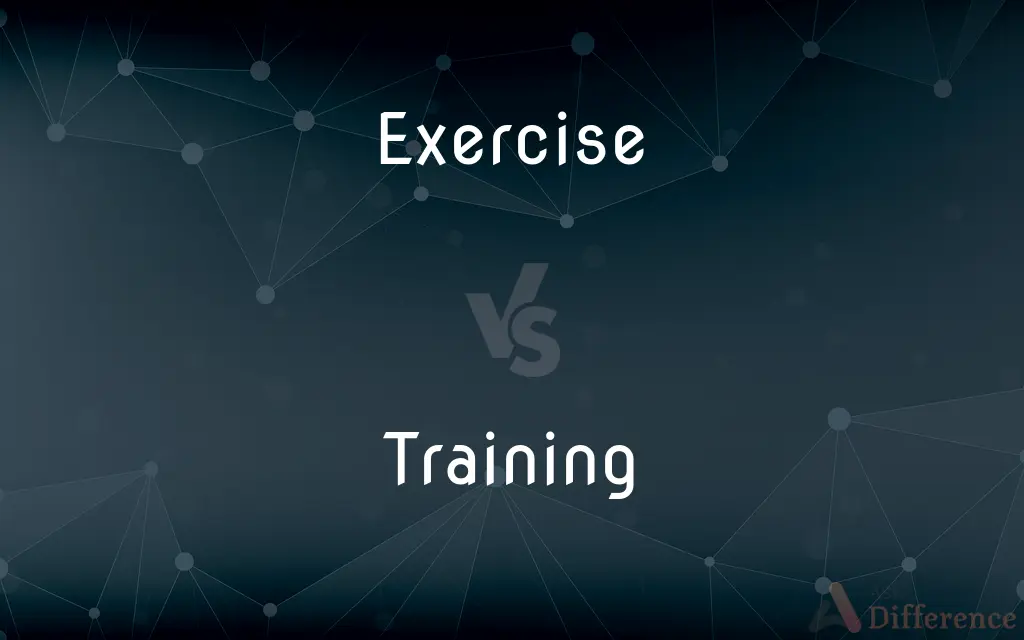Exercise vs. Training — What's the Difference?
By Tayyaba Rehman & Fiza Rafique — Published on October 1, 2023
Exercise is physical or mental activity aimed at maintaining general well-being. Training is a structured program to improve specific skills or achieve specific goals.

Difference Between Exercise and Training
Table of Contents
ADVERTISEMENT
Key Differences
Exercise refers to general physical or mental activities designed to improve health, enhance well-being, or maintain physical fitness. Training, on the other hand, refers to a systematic and often professional or vocational program intended to improve specific skills or achieve specific outcomes. Exercise can be spontaneous and varied, while training typically involves a structured and planned regimen.
Exercise often doesn't require specialized skills and is commonly done to improve overall health. Training usually demands a targeted approach, often with the help of a coach or mentor, to enhance certain skills or abilities. Exercise can be as simple as a daily walk or a casual swim, while training might involve a dedicated plan to improve your marathon time or gain proficiency in a certain career path.
Exercise can be a subset of training but doesn't have to be. For example, you might exercise by doing squats, but if you are training for a weightlifting competition, those squats would be part of a much broader, targeted program. Training tends to involve benchmarks and evaluations to measure progress toward specific goals, while exercise is more self-contained and doesn't necessarily aim for such specific outcomes.
Exercise generally focuses on the immediate benefits, such as stress relief or improved mood. Training, conversely, is often future-oriented, aiming for long-term benefits or specific milestones. In essence, all training involves exercise, but not all exercise is part of training.
Comparison Chart
Purpose
General well-being
Specific goals
ADVERTISEMENT
Structure
Often spontaneous
Structured and planned
Skills Required
Usually none
Specialized skills often needed
Goal Measurement
Typically none
Benchmarks and evaluations
Time Orientation
Immediate benefits
Long-term outcomes
Compare with Definitions
Exercise
Physical activity to maintain health
I do exercise every morning to keep fit.
Training
A program to improve specific skills
I'm in training for a marathon.
Exercise
Mental activity to stimulate the mind
Sudoku is a good exercise for the brain.
Training
Military instruction and drills
He completed his basic training.
Exercise
Military maneuvers or drills
The army conducted an exercise in the desert.
Training
Systematic physical conditioning
His training involves cardio and strength exercises.
Exercise
Use of a legal power or right
The exercise of free speech is crucial.
Training
Preparing for a particular job or task
She's in training to become a nurse.
Exercise
A specific task or problem for practice
The math exercise was difficult.
Training
Learning to modify behavior
Dog training can be challenging.
Exercise
Activity that requires physical or mental exertion, especially when performed to develop or maintain fitness
Walks every day for exercise.
Training
The process or routine of one who trains.
Exercise
A specific activity performed to develop or maintain fitness or a skill
Sit-ups and other exercises.
A piano exercise.
Training
The state of being trained.
Exercise
The active use or application of something
The exercise of good judgment.
Training
Present participle of train
Exercise
The discharge of a duty, function, or office.
Training
Action of the verb to train. en
Exercise
An activity having a specified aspect
An undertaking that was an exercise in futility.
Training
The activity of imparting and acquiring skills.
Exercise
A military maneuver or training activity.
Training
The result of good social upbringing.
Exercise
Exercises A ceremony that includes speeches, presentations, and other activities
Graduation exercises.
Training
(computing) The process by which two modems determine which protocol and speed to use; handshaking.
Exercise
To subject to practice or exertion in order to train, strengthen, or develop
Exercise the back muscles.
Exercise the memory.
Training
(voice recognition) The recording of multiple samples of a user's voice to aid pattern recognition.
Exercise
To put through exercises
Exercise a platoon.
Training
The act of one who trains; the act or process of exercising, disciplining, etc.; education.
Exercise
To make active use of; employ, apply, or exert
Exercise restraint.
Exercise control.
Training
Activity leading to skilled behavior
Exercise
To discharge (duties, for example).
Training
The result of good upbringing (especially knowledge of correct social behavior);
A woman of breeding and refinement
Exercise
To carry out the functions of
Exercise the role of disciplinarian.
Exercise
To execute the terms of (a stock option, for example).
Exercise
To alarm, worry, or anger; upset
An injustice that exercised the whole community.
Exercise
To engage in exercise.
Exercise
(countable) Any activity designed to develop or hone a skill or ability.
The teacher told us that the next exercise is to write an essay.
Exercise
Activity intended to improve physical, or sometimes mental, strength and fitness.
Swimming is good exercise.
I like to do my exercises every morning before breakfast.
I do crosswords for mental exercise.
Exercise
A setting in action or practicing; employment in the proper mode of activity; exertion; application; use.
The law guarantees us the free exercise of our rights.
Exercise
The performance of an office, ceremony, or duty.
I assisted the ailing vicar in the exercise of his parish duties.
Exercise
(obsolete) That which gives practice; a trial; a test.
Exercise
To exert for the sake of training or improvement; to practice in order to develop.
To exercise troops or horses;
To exercise one's brain with a puzzle
Exercise
(intransitive) To perform physical activity for health or training.
I exercise at the gym every day.
Exercise
(transitive) To use (a right, an option, etc.); to put into practice.
The tenant exercised his option to renew the tenancy.
She is going to exercise her right to vote.
Exercise
To occupy the attention and effort of; to task; to tax, especially in a painful or vexatious manner; harass; to vex; to worry or make anxious.
Exercised with pain
Exercise
(obsolete) To set in action; to cause to act, move, or make exertion; to give employment to.
Exercise
The act of exercising; a setting in action or practicing; employment in the proper mode of activity; exertion; application; use; habitual activity; occupation, in general; practice.
Exercise of the important function confided by the constitution to the legislature.
O we will walk this world,Yoked in all exercise of noble end.
Exercise
Exertion for the sake of training or improvement whether physical, intellectual, or moral; practice to acquire skill, knowledge, virtue, perfectness, grace, etc.
An exercise of the eyes and memory.
Exercise
Bodily exertion for the sake of keeping the organs and functions in a healthy state; hygienic activity; as, to take exercise on horseback; to exercise on a treadmill or in a gym.
The wise for cure on exercise depend.
Exercise
The performance of an office, a ceremony, or a religious duty.
Lewis refused even those of the church of England . . . the public exercise of their religion.
To draw him from his holy exercise.
Exercise
That which is done for the sake of exercising, practicing, training, or promoting skill, health, mental, improvement, moral discipline, etc.; that which is assigned or prescribed for such ends; hence, a disquisition; a lesson; a task; as, military or naval exercises; musical exercises; an exercise in composition; arithmetic exercises.
The clumsy exercises of the European tourney.
He seems to have taken a degree, and performed public exercises in Cambridge, in 1565.
Exercise
That which gives practice; a trial; a test.
Patience is more oft the exerciseOf saints, the trial of their fortitude.
Exercise
To set in action; to cause to act, move, or make exertion; to give employment to; to put in action habitually or constantly; to school or train; to exert repeatedly; to busy.
Herein do I Exercise myself, to have always a conscience void of offence.
Exercise
To exert for the sake of training or improvement; to practice in order to develop; hence, also, to improve by practice; to discipline, and to use or to for the purpose of training; as, to exercise arms; to exercise one's self in music; to exercise troops.
About him exercised heroic gamesThe unarmed youth.
Exercise
To occupy the attention and effort of; to task; to tax, especially in a painful or vexatious manner; harass; to vex; to worry or make anxious; to affect; to discipline; as, exercised with pain.
Where pain of unextinguishable fireMust exercise us without hope of end.
Exercise
To put in practice; to carry out in action; to perform the duties of; to use; to employ; to practice; as, to exercise authority; to exercise an office.
I am the Lord which exercise loving-kindness, judgment, and righteousness in the earth.
The people of the land have used oppression and exercised robbery.
Exercise
To exercise one's self, as under military training; to drill; to take exercise; to use action or exertion; to practice gymnastics; as, to exercise for health or amusement.
I wear my trusty sword,When I do exercise.
Exercise
The activity of exerting your muscles in various ways to keep fit;
The doctor recommended regular exercise
He did some exercising
The physical exertion required by his work kept him fit
Exercise
The act of using;
He warned against the use of narcotic drugs
Skilled in the utilization of computers
Exercise
Systematic training by multiple repetitions;
Practice makes perfect
Exercise
A task performed or problem solved in order to develop skill or understanding;
You must work the examples at the end of each chapter in the textbook
Exercise
(usually plural) a ceremony that involves processions and speeches;
Academic exercises
Exercise
Put to use;
Exert one's power or influence
Exercise
Carry out or practice; as of jobs and professions;
Practice law
Exercise
Give a work-out to;
Some parents exercise their infants
My personal trainer works me hard
Work one's muscles
Exercise
Do physical exercise;
She works out in the gym every day
Exercise
Learn by repetition;
We drilled French verbs every day
Pianists practice scales
Common Curiosities
What is Exercise?
Exercise is activity for enhancing physical or mental well-being.
What is Training?
Training is a planned program to achieve specific skills or goals.
Is Exercise the same as Training?
No, exercise is for general well-being, while training targets specific outcomes.
Can Exercise be part of Training?
Yes, exercise can be a component of a broader training program.
Do I need special skills for Exercise?
Usually no, exercise often requires no specialized skills.
Do I need special skills for Training?
Often yes, training may require specialized skills or a mentor.
Can I do Exercise without a plan?
Yes, exercise can be spontaneous and varied.
Is Training short-term or long-term?
Training is usually aimed at long-term goals.
Is Exercise always physical?
No, exercise can also be mental, like brain teasers.
How is progress measured in Exercise?
Typically, progress in exercise is not formally measured.
Is Training always physical?
No, training can also be mental or vocational.
Is Exercise short-term or long-term?
Exercise is generally for immediate benefits.
Can I do Training without a plan?
No, training usually involves a structured plan.
How is progress measured in Training?
Progress in training is often evaluated through benchmarks.
Who usually conducts Training?
Training is often conducted by professionals or mentors.
Share Your Discovery

Previous Comparison
Web Surfing vs. Web Browsing
Next Comparison
Product Marketing vs. Service MarketingAuthor Spotlight
Written by
Tayyaba RehmanTayyaba Rehman is a distinguished writer, currently serving as a primary contributor to askdifference.com. As a researcher in semantics and etymology, Tayyaba's passion for the complexity of languages and their distinctions has found a perfect home on the platform. Tayyaba delves into the intricacies of language, distinguishing between commonly confused words and phrases, thereby providing clarity for readers worldwide.
Co-written by
Fiza RafiqueFiza Rafique is a skilled content writer at AskDifference.com, where she meticulously refines and enhances written pieces. Drawing from her vast editorial expertise, Fiza ensures clarity, accuracy, and precision in every article. Passionate about language, she continually seeks to elevate the quality of content for readers worldwide.














































